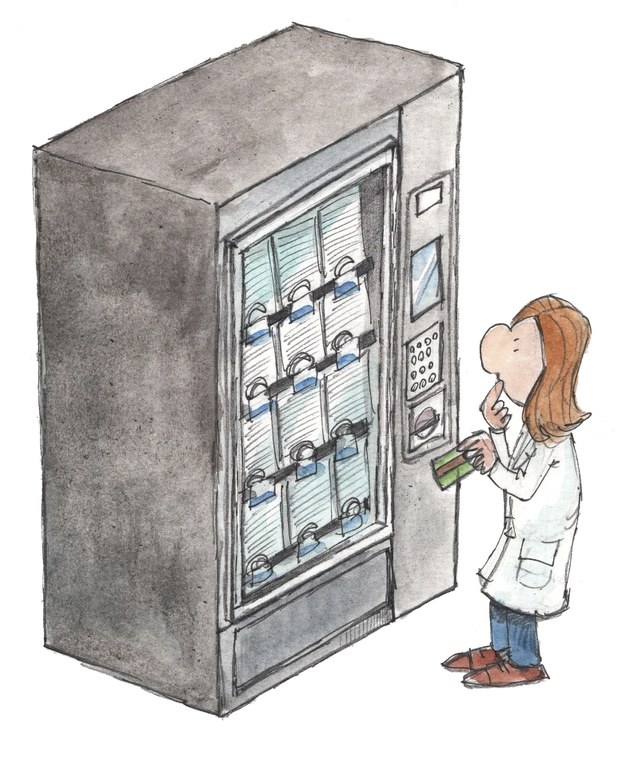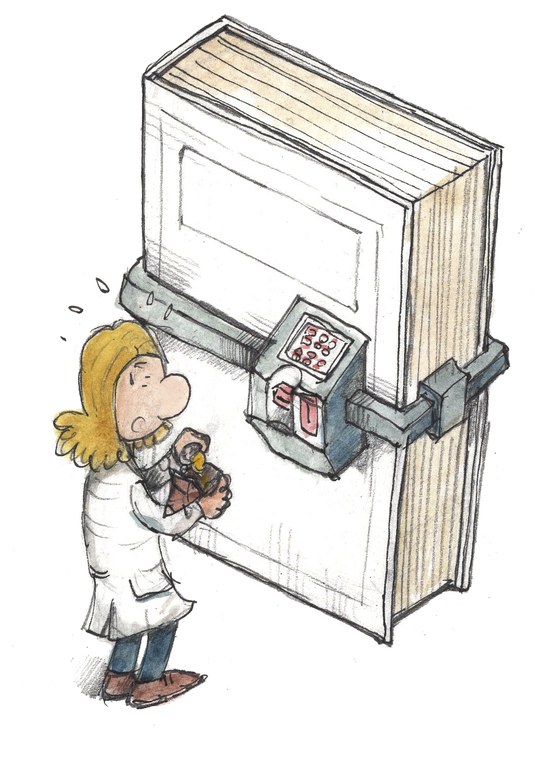by Demmy Verbeke, KU Leuven Libraries [1]
Recent reflections on the push for Open Access (OA), sometimes driven by discussions about the implementation of Plan S, frequently point out negative financial implications. In spite of high hopes and expectations, it is argued that a switch to OA, when realized through working with the same publishing partners, e.g. by agreeing on offsetting deals (i.e. deals incorporating both the cost of reading and the cost of publishing), will not alleviate the cost of scholarly communication.[2] OA as such is not more expensive than the traditional subscription model, but a commercial approach to OA will make matters worse instead of better.[3] The cost of publishing in the OA model will be at least as big a problem as the cost of reading was in the traditional subscription model, and the oligopoly already held by commercial players in the field of scholarly publishing[4] will strengthen even further and extend to other parts of the research cycle. For indeed, “if the market trend of the last years continue, in the next ten years, two or three commercial giants will exploit not only publications but the entire academic workflow, from research data management tools and services, tools to analyse research data (such as through text and data mining), and tools used in research evaluation, all the way to tools to disseminate results and engage society beyond the scientific world.”[5]

The conviction that we need an alternative for the commercial approach if we want an affordable and sustainable scholarly communication system is therefore growing. One example is the emergence of more and more library and academic-led OA publishing, focusing on a community-owned infrastructure.[6] Moreover, in a recent report to the European Commission about the future of scholarly publishing, it is stressed that “elements essential for the function of the core system [of a scholarly communication infrastructure] should remain in public hands” and that “cost-effectiveness is a key issue for all the actors in scholarly communication, and for the health of the whole ecosystem”[7], without commenting on the fact that, at present, neither of both requirements are met. Finally, the elimination of a commercial profit motive is mentioned as a necessary condition in the transition to a scholarly communication system that does not invite abuse and exploitation.[8]
In the past, KU Leuven Libraries has illustrated its support for such a non-commercial alternative, e.g. as an early supporter of the Library Partnership Subsidy model championed by the Open Library of Humanities.[9] In 2018, these efforts were intensified by establishing the KU Leuven Fund for Fair OA, in the hope to stimulate the market share of non-profit players in the field of scholarly communication and to safeguard some much-needed competition. The fund is used to finance four different clusters of activity, united by one characteristic, namely that they need to adhere to the principles of fair OA which include that authors retain copyright and that any fees paid to publishers are low, transparent, and in proportion to the work carried out.
Firstly, the fund provides financial support for community-owned infrastructures for OA or innovative publishing initiatives which respect fair OA principles. Examples include subsidies for DOAJ – Directory of Open Access Journals, DOAB – Directory of Open Access Books, OAPEN, Open Book Publishers and F1000Research. Secondly, the fund also covers membership costs for consortia and advocacy organizations focused on a non-commercial approach to scholarly communication, such as FOAA – the Fair Open Access Alliance, which ties in well with our involvement in related enterprises such as SCOSS – the Global Sustainability Coalition for Open Science Services and OPERAS – Open Access in the European Research Area through Scholarly Communication.

Thirdly, the fund finances (part of) the publishing costs of OA books produced by Leuven University Press (LUP), i.e. a publisher adhering to the principles of fair OA and recognized by the European Research Council (ERC), the Wellcome Trust, and the Austrian Science Fund (FWF) as a trustworthy OA provider. Authors can apply for 1/3, 2/3 or even 100% of the Book Processing Charges (BPC), depending on their affiliation: KU Leuven authors can apply for 2/3 or 100% (if they do not have access to additional funds) whereas authors not affiliated with KU Leuven can apply for 1/3 (and have to provide the remaining 2/3 themselves). The base cost for the publication of an OA book with LUP is € 7.500 and includes the total production cost, covering pre-press services, English language editing, typesetting, layout, marketing, distribution and promotion, as well as hosting on digital library platforms. Alongside the OA production (ePDF and ePUB), freely available on JSTOR, Project MUSE and OAPEN and also included in the DOAB, LUP commits itself to ensuring that a print version of an OA book remains simultaneously available for sale. OA books follow the same production and marketing trajectory as traditionally produced volumes and thus carry the Guaranteed Peer Reviewed Content (GPRC) label.
A fourth and final area of activity is the financing of Article Processing Charges (APCs) for articles published in qualitative journals which adhere to fair OA principles. The conditions to be eligible for support include that the journal must be listed in the DOAJ, as well as Web of Science and/or VABB-SHW (i.e. the list used for Humanities and Social Sciences in Flanders); that only publications appearing in full, immediate and worldwide OA qualify for financial support; that the author(s) retain(s) copyright and that the APC cost should not exceed €1.000.[10] The APC part of the fund is reserved to researchers affiliated with KU Leuven.
After the first year of operations, we are able to draw some preliminary conclusions. The part of the fund providing financial support for community-owned infrastructures for OA, innovative publishing initiatives and membership costs for consortia focused on a non-commercial approach to scholarly communication is successful. It highlights the commitment of the university to the development of new and innovative publishing models which are cost-effective and put scholars back in charge of the dissemination of their research results. As far as the BPC part is concerned, it was so far agreed that the KU Leuven Fund for Fair OA would finance thirteen books published by LUP. We therefore believe that the BPC part of the fund can be qualified as a success as well. Finally, forty funding applications for APCs were received, of which twenty five were approved (the fifteen remaining ones were all rejected because the APC cost was set according to profit bearing principles). The APC part is thus not hugely effective in terms of what gets funded, but has proven a good conversation-starter about the differences between for-profit and non-profit publishing. The main general result is that the establishment of this fund has given some new energy to discussions about OA at KU Leuven, highlighting a realistic alternative for a commercial and unsustainable implementation of OA, which was especially timely considering the ongoing debates about the implementation of Plan S.
About the author
As Head of KU Leuven Libraries Artes, Demmy Verbeke is responsible for collections and services for the Arts and Humanities. As a member of the management team with primary responsibilities for research, he also contributes to the strategic development and operational management of KU Leuven Libraries as a whole. In this context, he especially focuses on scholarly communication, open science and digital scholarship in the humanities. He is a strong believer in Fair Open Access and serves on the editorial board of the Open Library of Humanities and the Journal of Librarianship and Scholarly Communication. ORCID https://orcid.org/0000-0002-1020-3659.
[1] The present contribution is a preprint of an article in preparation for Arabesques, i.e. het tijdschift van het Franse Abes – Agence Bibliographique de l’Enseignement Supérieur.
[2] See, e.g., Liam Earney, ‘Offsetting and its discontents: challenges and opportunities of open access offsetting agreements’, Insights, 2017, 30 (1), http://dx.doi.org/10.1629/uksg.345 and Toby Green, ‘Is open access affordable? Why current models do not work and why we need internet-era transformation of scholarly communications’, Learned Publishing, 2019, 32: 13-25, https://doi.org/10.1002/leap.1219.
[3] Nina Schönfelder, ‘APCs: Mirroring the impact factor or legacy of the subscription-based model?’, 2018, https://pub.uni-bielefeld.de/record/2931061, pp. 23-24; Björn Brembs, ‘Why Open Access Big Deals are worse than subscriptions’, 2018, http://bjoern.brembs.net/2018/04/why-open-access-big-deals-are-worse-than-subscriptions/.
[4] Vincent Larivière – Stefanie Haustein – Philippe Mongeon, ‘The oligopoly of academic publishers in the digital era’, PLOSOne, 2015, https://doi.org/10.1371/journal.pone.0127502.
[5] Science Europe, Workshop Report – Challenging the Current Business Models in Academic Publishing: Accelerators and Obstacles to the Open Access Transition, 2018, https://www.scienceeurope.org/wp-content/uploads/2018/06/SE_WS_Report_OA_Big_Deals.pdf, p. 7.
[6] Joe Deville, Jeroen Sondervan, Graham Stone, Sofie Wenström, ‘Rebels with a cause? Supporting library and academic-led Open Access publishing’, 2018, preprint available at http://doi.org/10.5281/zenodo.1306506.
[7] European Commission, Future of Scholarly Publishing and Scholarly Communication: Report of the Expert Group to the European Commission, 2019, https://publications.europa.eu/en/publication-detail/-/publication/464477b3-2559-11e9-8d04-01aa75ed71a1, p. 27 and p. 29.
[8] Kevin L. Smith, ‘Examining publishing practices: moving beyond the idea of predatory open access’, Insights, 2017, 30 (3), https://doi.org/10.1629/uksg.388, p. 9.
[9] See also Insights into the Economy of Open Scholarship: A look into the Open Library of Humanities with Martin Paul Eve, Co-founder, 2019, https://www.openlibhums.org/news/330/.
[10] If the total cost of the APC is higher than €1.000, an additional motivation needs to be added, detailing how this costly APC reflects the factual production cost (with a detailed breakdown of the costs).
